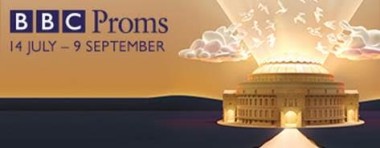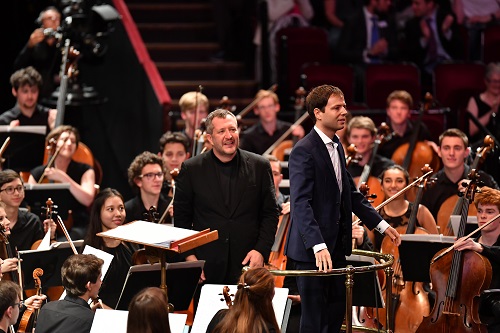
 United Kingdom 2017 BBC PROMS 28 – Coll, Adès, Stravinsky: National Youth Orchestra of Great Britain / Thomas Adès (conductor), Royal Albert Hall, London, 5.8.2017. (CC)
United Kingdom 2017 BBC PROMS 28 – Coll, Adès, Stravinsky: National Youth Orchestra of Great Britain / Thomas Adès (conductor), Royal Albert Hall, London, 5.8.2017. (CC)

conducted by Thomas Adès (c) Chris Christodoulou.
Francisco Coll –Mural (London premiere)
Adès – Polaris
Stravinsky – The Rite of Sping
This concert was certainly a contrast to the previous night’s tribute to Ella and Dizzy. The indefatigable Thomas Adès headed the equally unquenchable National Youth Orchestra of Great Britain (of which he was once a member) in a Prom that showed decidedly modernist leanings and included a London premiere and a Proms premiere (Polaris).
Francisco Coll was born in Valencia, studying as a trombonist at Valencia Conservatory before continuing his studies at Madrid and, most significantly in the current context, in London with Thomas Adès. Not one to take private students, Coll was a departure for Adès, a statement of belief, if you will. Coll also studied at the Guildhall with Richard Baker. Interestingly, one of his commissions (from the Ensemble Intercontemporain) is for an orchestration of Wagner’s Wesendonck-Lieder for mezzo and 17 players. Coll’s Four Iberian Miniatures was performed at the Proms last year in a version for violin and chamber orchestra by Augustin Hadelich and the Britten Sinfonia, again under Adès.
The piece here, Mural, dates from 2013-15 and is cast in five movements: a piece which “could be understood as a … symphony,” the composer states. The title comes from the idea that developments in Coll’s musical language over the last decade are presented across the piece. It is a “Grotesque Symphony,” a place where “Dionysus meets Apollo.” There is absolutely no doubting Coll’s expertise as an orchestrator, and his use of panels of sound is immediately apparent – something that can occasionally come across as a succession of well-played gestures. There was more that a suggestion of an Ivesian festival in the first movement; the second movement is a development of Coll’s Hyperlude III for solo violin of 2014 (commissioned by Manuel Tomás and premiered in Coll’s home town of Valencia). Coll refers to this as a “kind of scherzo” – it is indeed an angular dance with plenty of youthful energy. Quite right, too – a young composer (born 1985) and one of the world’s greatest youth orchestras should spell exactly that. The trajectory of the third movement is interesting, moving from a quiet string canon to a climax that, in its chthonic leanings, seems to point towards Birtwistle. The glittering dance of the fourth movement (which quotes, in fragmentation, the Introit from Victoria’s Requiem) leads to the finale, Coll’s attempt at post-Mahlerian heft and including a most intriguing use of piano tremolo (an effect under-used by contemporary composers, surely?). There is a palpable sense of a refusal to compromise about Coll’s writing, and perhaps that is what appeals to Adès, who is a fervent champion of Coll’s music? Adès himself has, after all, ploughed his own path …
An example of which is Adès’ piece Polaris (“voyage for orchestra”) of 2010, receiving its first performance at the Proms. Written for the opening of the New World Symphony’s hall in Maine, it reflects the idea of “space” in its positioning of instruments, including spatially separated brass in the gallery (trumpets at one side, lower brass instruments at the other). From this perspective, the Albert Hall is the perfect arena – pardon the pun – for Adès’ work. Out-of-phase keyboards open the work, with pizzicato strings destabilising any attempts at regularity. The piece, like Stravinsky’s Rite, has virtuoso elements for the orchestra – especially noteworthy were the piccolos and flutes; but it also seems to link to the tradition of Holst The Planets. Perhaps Adès might not thank me for the parallel (who knows, maybe he would); he probably would thank me less for the observation that parts also seem to link to Americana and even film music in their graphic gesturalism. While I found the opera The Exterminating Angel a major contribution to the operatic repertoire (see review), this packed less of a punch on all levels. The NYO players though were astonishing in their response. That they could give an all-out performance of this and the new work prior is little short of unbelievable. Discipline has always been part of the NYO methodology (you can see it even in the way they enter the stage); nowhere has it paid off better than in the glowing clarity they brought to these scores.
And so to the Rite. This was not the first time this orchestra has tackled it, of course (they did so famously under both Rattle and Boulez). Adès brought his own spin, allowing principal bassoon Lucy Dundas full rein for her opening solo. The scoring was vividly brought to life: shrieking E flat clarinet, divisi lower strings that positively glowed. Perhaps the “Dance of the Young Girls” could have been more savage, but savagery was really not Adès’ script here – his fairly rapid tempi reflected this.
Nowhere else would one hear a performance in which soloists shine (Olivia Gandee’s horn contributions merit a mention) and yet sections play spectacularly as a unit (the wind in particular). The delicacy of the trumpets at the opening of Part II was infinitely touching in a work where maybe one does not expect to be touched emotionally on an interior level; similarly, there was a splendid “choir” of violas. It is important to note, too, that “savage” is not the only way to invoke the “primal” and Adès found the latter unerringly – in fact, there was a primal edge to the entire performance that completely belied the participants’ ages. From the percussion, it was the timpani that provided the spine of the work, and memorably at that.
Once more from the NYO, our national treasure, a remarkable evening. New music played with the freshness of youth is very special; as is the ability to give a Rite of such preternatural maturity. Bravo.
Colin Clarke
For more about the BBC Proms click here.